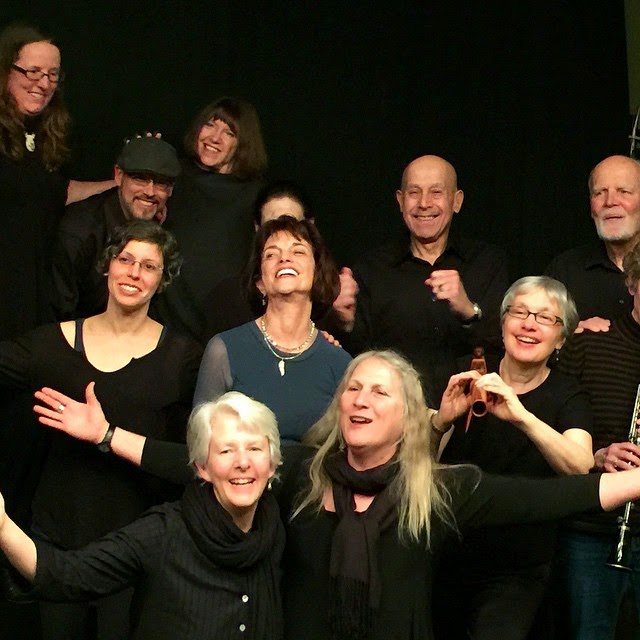We’re in the family car, most likely a basic Ford, Chevy, or Plymouth. Dad’s company alternated every three years purchasing one of the three economy brands. The trip is long enough that one or another of us four kids have asked the question, “Are we there yet? We finally become involved in something fun to while away the time– singing songs from camp or scouts or church choir. We’re having a contest as to who can remember the most words to the songs as we begin singing them. Then mother turns her head around from the front seat and says casually over her shoulder, “If you’re singing for us, you can stop now.” This scene was repeated many times and at some point, it occurred to me that mother repeated this snarky putdown so easily and so often because it must have been what her parents had said to her.
I teach InterPlay, an improvisational system that helps people unlock the wisdom in their own bodies, and one of the key pathways to discovering that wisdom is our voice. We encourage people to make friends with their own voice, “vocal play” we call it, and to use their voice to play and create with others. No matter what may have happened in one’s live to discourage accessing the voice–and incidents like the one I describe above are quite common, reclaiming one’s voice turns out to be an empowering, delight filled activity. The outcome for our sense of wellbeing goes way beyond the immediate situation of playing with our voices in community.
One of the biggest losses during this pandemic has been the prohibition on singing together in person lest we spread the air-born virus. This has meant that one of the most time-honored ways to create group connection and solidarity has been lost to people of all ages all across the world. Choirs, choruses, barbershop quartets–even singing around a campfire have been outlawed or discouraged. People’s creativity cannot be total stifled however, remember the opera singers in Italy singing arias from their balconies during the shutdown, loud enough for all the neighbors to hear.
Transferring vocal play to the zoom platform has been more challenging than other visual or auditory activities such as story-telling or moving. The automated platform limits on sound reproduction and the time lags from various time zones interfere with voices coming together online as they do so beautifully in person. If you and your family have tried celebrating a birthday online by singing Happy Birthday to someone you have experienced what I’m referring to.
Recently I’ve been taking an online class with my favorite vocal play instructor Trish Watts. As a co-founder of InterPlay Australia and a registered Voice Movement Therapy practitioner, Trish has incredible skill in helping people warm up their singing and sounding “muscles.” She considers this “finding the nerve to voice who we truly are.” This blessing of the pandemic has allowed us to not have to travel to play together yet COVID has taken away opportunities to engage in the potential harmonies in vocal sounding and singing that can only happen in person.
As director of a Threshold Choir for the past dozen years Trish reminded me of another big loss due to COVID. This loss involves people needing support as they transition from this life. Having several people sing harmonies at the bedside of a person who is terminally ill is an ancient tribal practice that has in the past twenty years in western cultures become a movement. Using voices to create a sacred space builds a loving bridge for the dying person as they let go of this life. It encourages relaxation and the realization that we are not alone. Due to the risk of spreading COVID many threshold choirs have continued to meet online for their own benefit but have had to suspend their work until it is safe to resume. May that happen soon, for the benefit of all concerned because people singing in those choirs experience the vibrations of love and kindness that they help to bring into the room. For myself, even with the limitations of the zoom platform, I’ve been able to confirm for myself what Trish maintains about befriending our voices–“Whether at work, home or creating in between, we simply feel more alive and embodied when we use our voices.” [email protected]


